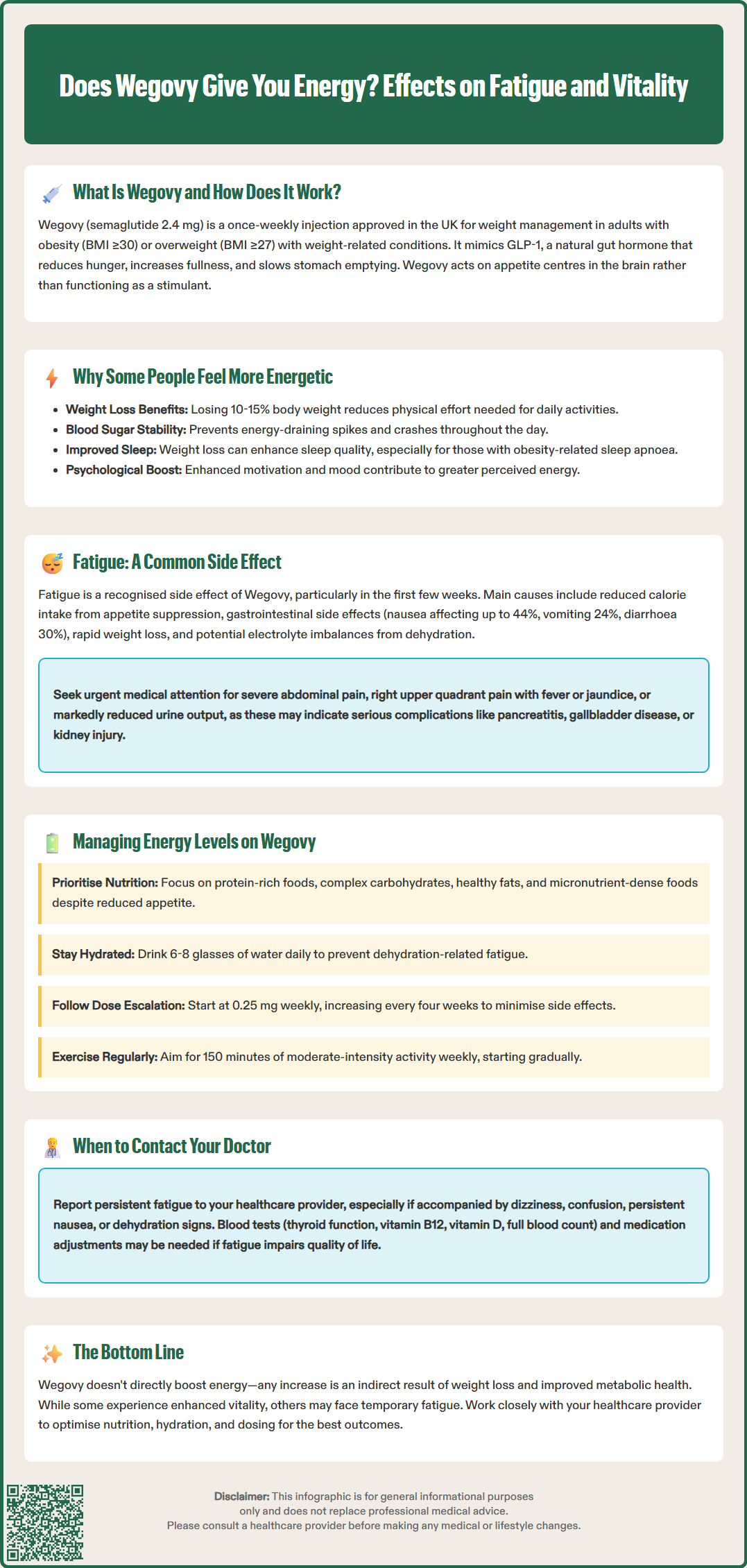
Does Wegovy give you energy? This is a common question among patients considering or taking semaglutide for weight management. Wegovy (semaglutide 2.4 mg) is a GLP-1 receptor agonist licensed in the UK for obesity treatment, working primarily through appetite suppression rather than as a stimulant. Whilst some patients report feeling more energetic due to weight loss and improved metabolic health, others experience fatigue, particularly during initial treatment. Understanding how Wegovy affects energy levels—both positively and negatively—helps patients and clinicians optimise treatment outcomes. This article examines the mechanisms behind energy changes, common side effects, and practical strategies for maintaining vitality during Wegovy therapy.
Quick Answer: Wegovy does not directly increase energy but may improve energy levels indirectly through weight loss and better metabolic health, though fatigue is also a recognised side effect.
Wegovy (semaglutide 2.4 mg) is a prescription medicine licensed in the UK for weight management in adults with obesity (BMI ≥30 kg/m²) or overweight (BMI ≥27 kg/m²) with at least one weight-related comorbidity, such as type 2 diabetes or hypertension. It is administered as a once-weekly subcutaneous injection and is intended to be used alongside a reduced-calorie diet and increased physical activity.
Semaglutide belongs to a class of medications called glucagon-like peptide-1 (GLP-1) receptor agonists. These drugs mimic the action of GLP-1, a naturally occurring hormone released by the intestine in response to food intake. GLP-1 receptor agonists work through several mechanisms to promote weight loss:
Appetite suppression: Semaglutide acts on receptors in the brain's appetite centres, particularly the hypothalamus, reducing feelings of hunger and increasing satiety after meals.
Delayed gastric emptying: The medication slows the rate at which food leaves the stomach, prolonging the sensation of fullness.
Improved glucose regulation: In people with type 2 diabetes, semaglutide enhances insulin secretion in a glucose-dependent manner and suppresses inappropriate glucagon release.
Wegovy does not directly stimulate the central nervous system or act as a traditional stimulant medication. Its primary mechanism centres on appetite regulation and metabolic effects rather than direct energy enhancement. The MHRA has granted a UK marketing authorisation for Wegovy, and NICE Technology Appraisal 875 (TA875) supports its use within specialist weight management services for eligible patients. NHS funding criteria are narrower than the licensed indication, with specific BMI thresholds and time-limited use. Understanding how Wegovy works helps contextualise why patients may experience changes in their energy levels during treatment.

Mounjaro® is the most innovative GLP-1 medication proven to dramatically curb appetite, hunger, and cravings to help professional men achieve substantial weight loss.
Start Here
Wegovy® is a weekly injectable GLP-1 medication with proven effectiveness in reducing appetite, hunger, and cravings to help busy professionals lose significant weight.
Start HereMany patients report feeling more energetic whilst taking Wegovy, though this is typically an indirect effect rather than a direct pharmacological action of semaglutide. There is no official evidence that Wegovy acts as a stimulant or directly increases energy levels through metabolic pathways. Instead, several secondary factors associated with weight loss and improved metabolic health may contribute to enhanced energy perception.
Weight reduction itself often leads to improved energy levels. Carrying excess body weight requires more physical effort for daily activities, and as patients lose weight, they frequently report reduced fatigue and greater ease of movement. Clinical trials (STEP programme) have demonstrated that Wegovy produces an average weight loss of 10–15% of initial body weight over 68 weeks, which can translate to significant functional improvements.
Improved glycaemic control in patients with type 2 diabetes or prediabetes may contribute to more stable energy throughout the day. Blood glucose fluctuations—particularly postprandial spikes and subsequent drops—can cause fatigue and lethargy. Semaglutide's glucose-regulating effects help maintain more consistent blood sugar levels, potentially reducing these energy dips. However, patients taking Wegovy alongside insulin or sulfonylureas should be aware of potential hypoglycaemia, which can cause fatigue and dizziness.
Better sleep quality often accompanies weight loss, particularly in patients with obesity-related sleep apnoea. As weight decreases, breathing during sleep may improve, leading to more restorative rest and consequently better daytime energy. Patients with diagnosed sleep apnoea should not alter CPAP treatment without clinical advice. Some patients also report psychological benefits such as increased motivation and improved mood, which may manifest as perceived increases in energy and engagement with daily activities.

Whilst some patients experience improved energy, fatigue and tiredness are recognised side effects of Wegovy, particularly during the initial weeks of treatment. Clinical trial data and post-marketing surveillance have identified fatigue as a relatively common adverse effect, though it typically affects a minority of patients.
Several mechanisms may contribute to treatment-related fatigue:
Caloric restriction: Wegovy's appetite-suppressing effects can lead to significantly reduced food intake. If patients consume insufficient calories or nutrients, they may experience tiredness, weakness, or reduced stamina. This is particularly relevant during the dose-escalation phase when appetite suppression is most pronounced.
Gastrointestinal side effects: Nausea, vomiting, and diarrhoea are the most common adverse effects of Wegovy, affecting up to 44%, 24%, and 30% of patients respectively according to the SmPC. These symptoms can lead to reduced nutritional intake, dehydration, and subsequent fatigue.
Rapid weight loss: Whilst weight reduction is the therapeutic goal, losing weight too quickly can temporarily affect energy levels as the body adapts to metabolic changes.
Electrolyte imbalances: Persistent vomiting or diarrhoea may lead to dehydration and electrolyte disturbances, contributing to weakness and fatigue.
Most patients find that fatigue often improves over time, especially after dose escalation is complete. However, persistent or severe tiredness warrants medical review. Patients should seek urgent medical attention for severe, persistent abdominal pain (possible pancreatitis), right upper quadrant pain/fever/jaundice (possible gallbladder disease), or markedly reduced urine output (possible acute kidney injury). They should also contact their GP or prescribing clinician if they experience debilitating fatigue, particularly if accompanied by dizziness, confusion, persistent nausea, or signs of dehydration. Healthcare professionals may need to assess for complications, adjust the dose, or investigate alternative causes of fatigue such as anaemia, thyroid dysfunction, or vitamin deficiencies.
Maintaining optimal energy levels whilst taking Wegovy requires a balanced approach to nutrition, hydration, and lifestyle management. The following evidence-based strategies can help patients maximise the benefits of treatment whilst minimising fatigue:
Nutritional adequacy is paramount. Despite reduced appetite, patients should ensure they consume sufficient calories and nutrients to support basic metabolic needs. Focus on:
Protein-rich foods (lean meats, fish, eggs, legumes, dairy) to preserve muscle mass during weight loss
Complex carbohydrates (whole grains, vegetables) for sustained energy release
Healthy fats (nuts, seeds, olive oil, avocado) for essential fatty acids and fat-soluble vitamins
Micronutrient-dense foods to prevent deficiencies that can cause fatigue
Hydration is essential, particularly if experiencing gastrointestinal side effects. Aim for 6–8 glasses of water daily, increasing intake during hot weather or physical activity. Dehydration can significantly impair energy levels and cognitive function.
Gradual dose escalation, as per the licensed regimen, helps minimise side effects. Wegovy is initiated at 0.25 mg weekly and increased every four weeks to the maintenance dose of 2.4 mg (or 1.7 mg if 2.4 mg is not tolerated). Temporary dose holds or slower titration may improve tolerability if side effects are significant.
Regular physical activity, even at modest levels, can paradoxically improve energy. The UK Chief Medical Officers recommend at least 150 minutes of moderate-intensity activity weekly. Start gradually and increase activity as fitness improves.
Sleep hygiene supports energy restoration. Maintain consistent sleep schedules, create a restful environment, and address any sleep disorders with your healthcare provider.
Monitoring and communication with healthcare professionals is essential. Patients should attend scheduled follow-up appointments and report persistent fatigue, as this may indicate the need for nutritional assessment, blood tests (including full blood count, thyroid function, vitamin B12, vitamin D, and potentially renal function/electrolytes), or medication adjustment. Women of childbearing potential should use effective contraception during treatment and stop Wegovy at least 2 months before a planned pregnancy. Patients should report suspected side effects via the MHRA Yellow Card Scheme (yellowcard.mhra.gov.uk). If fatigue significantly impairs quality of life despite these measures, alternative weight management strategies may need consideration.
No, Wegovy (semaglutide) does not act as a stimulant or directly increase energy through metabolic pathways. Any improvements in energy levels are typically indirect effects of weight loss, improved glycaemic control, and better overall metabolic health rather than direct pharmacological stimulation.
Fatigue is a recognised side effect of Wegovy, often resulting from reduced caloric intake due to appetite suppression, gastrointestinal side effects such as nausea and vomiting, or rapid metabolic changes during weight loss. Most patients find this improves over time, particularly after completing dose escalation.
Maintain energy by ensuring adequate nutrition despite reduced appetite, staying well hydrated, following the gradual dose escalation schedule, engaging in regular physical activity, and prioritising good sleep hygiene. If fatigue persists or worsens, consult your healthcare provider for assessment and potential nutritional or medication adjustments.
All medical content on this blog is created based on reputable, evidence-based sources and reviewed regularly for accuracy and relevance. While we strive to keep content up to date with the latest research and clinical guidelines, it is intended for general informational purposes only.
DisclaimerThis content is not a substitute for professional medical advice, diagnosis, or treatment. Always consult a qualified healthcare professional with any medical questions or concerns. Use of the information is at your own risk, and we are not responsible for any consequences resulting from its use.